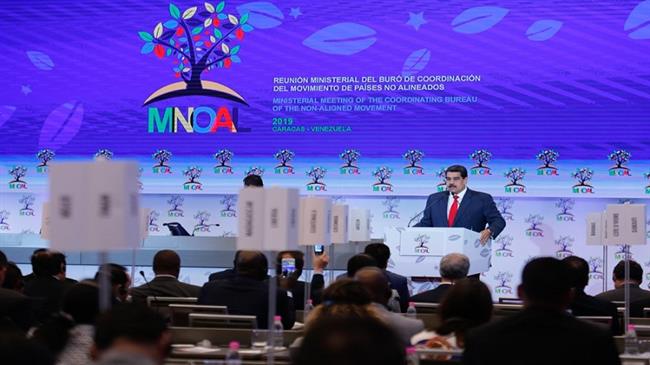Trump’s sanctions have come at a cost for America: US experts
Experts say the United States has been at a loss in the foreign relations and economic areas under President Donald Trump as a result of his excessive reliance on the policy of sanctions against other countries.
Although past US administrations have relied on sanctions, Trump has used them in excess at a cost to the US, Liz Rosenberg, the director of the Energy, Economics, and Security Program at the Center for a New American Security, was on Monday quoted by the Associated Press as saying.
She and others said inordinate resort to the bans had come to jeopardize the US’s relations with its main allies in Europe and elsewhere as well as with less America-friendly countries.
Washington once used to coordinate such actions with the Europeans but is now going it alone, noted Rosenberg, who used to be a senior adviser to the Treasury Department’s undersecretary for terrorism and financial intelligence.
“This is a brand new reality that has never been seen in modern times,” she said. “There are those in Europe who feel not just harmed by the United States, but also targeted by the United States.”
AP cited Gibraltar’s recent release of an Iranian-operated supertanker, which had been held there by Britain, as an instance of Europe’s weariness of Washington’s so-called punitive measures. Adrian Darya 1, then called Grace 1, was being kept in Gibraltar at the request of the United States, which has been trying to hamper Iran’s oil sales through sanctions.
Washington re-imposed old sanctions and other nuclear-related targeted measures against Tehran last year after unilaterally leaving a multilateral nuclear agreement with the Islamic Republic and other countries.
The news agency described the sensation resulting from the US policy as “a kind of sanctions fatigue.”
Since Trump took office, the US administration has been imposing sanctions against world countries from Latin America to the Middle East relatively every week.
More than 2,600 people, companies, ships, and planes have been targeted so far since Trump took office. “The daily pace is intense,” Sigal Mandelker, the current treasury undersecretary for terrorism and financial intelligence, acknowledged.
“President Trump has completely conflated economic sanctions and commercial policy,” said Gary Haufbauer, a senior fellow with the Peterson Institute for International Economics, who was a senior treasury official under ex-president Jimmy Carter.
“I don’t see that the US is having any positive effect on” China and Russia, which have had their American business ties compromised by Trump’s sanctions and tariffs, he said.
According to Haufbauer, however, this was a “pivot point” in world economic relations. Asian countries, he said, are now deferring to China’s perspective on the US, and American alliances with European nations are being weakened by Trump’s reliance on sanctions.
“The US, through its trade policy, has managed to isolate itself,” he said.
VIDEO | Report flags India’s violation of rights of Rohingya detainees
Turkey's foreign minister meets Syria's de facto leader in Damascus
'Next to impossible' to rescue patients from Gaza's Kamal Adwan Hospital: Director
VIDEO | Vietnam current prosperity
Report blames gasoil exports for shortage at Iranian power plants
VIDEO | Hind Rajab Foundation names Israeli war criminals vacationing after Gaza genocide
VIDEO | Australians rally for Gaza ahead of Christmas festivities
VIDEO | Attacks on Sana'a














 This makes it easy to access the Press TV website
This makes it easy to access the Press TV website